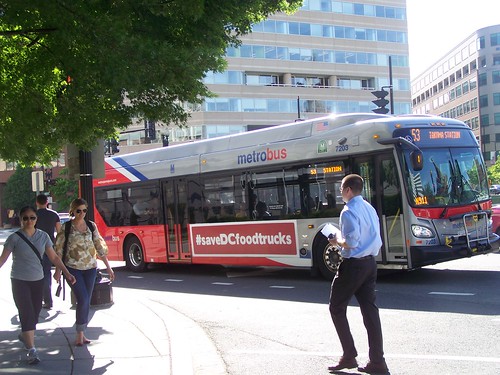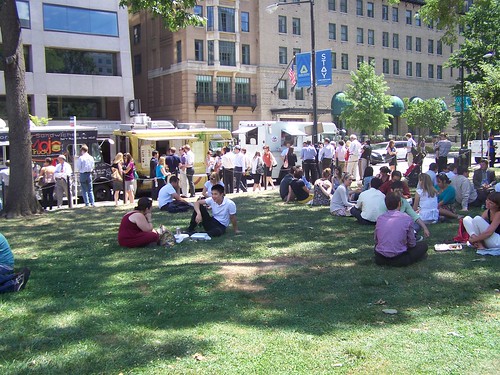Food truck issue revisited (DC)
 The food truck legality question is of issue now in DC, because the city's Department of Consumer and Regulatory Affairs has prepared regulations that are pretty constricting.
The food truck legality question is of issue now in DC, because the city's Department of Consumer and Regulatory Affairs has prepared regulations that are pretty constricting.See "Curbed: Could New Regulations Kill DC's Food Truck Culture" from the Washington City Paper. The anti-regulation oriented Washington Examiner has editorialized on the subject, "To protect restaurants, D.C. may curb food trucks."
The very restrictive DCRA approach is mostly in response to advocacy by the Restaurant Association of Metropolitan Washington (DC legislative advocacy page) and the various Business Improvement Districts, who rather than plan for the overall vitality of their commercial district area, tend to represent the interests of property owners first and foremost.
Although I agree that there are some logistic issues, and nuisance issues (cleaning up after food trucks), taxation questions--originally food trucks just paid a flat fee rather than 10% on actual sales--that needed to be addressed, which the regulations also address.
 I have written a bunch of posts about the issue over the years, focused on how food trucks and outdoor markets allow for vitality, capital formation, business development, and methods for serving a greater variety of consumer market segments.
I have written a bunch of posts about the issue over the years, focused on how food trucks and outdoor markets allow for vitality, capital formation, business development, and methods for serving a greater variety of consumer market segments.Some of the entries include:
-- Value of food trucks (Portland Oregon study), 2012
-- Food trucks as a way in, 2011
-- Another scale of planning failure: neighborhood vs. city-wide interests and food trucks, 2012
But the broader issue of whose interests are being represented foremost by a commercial/business improvement district represent led me to write the entry below, "Business improvement districts and boundary spanning," which I am reprinting, from January 2011.
Business improvement districts are created by property owners (and businesses) as a management mechanism to provide services that collectively improve the commercial district and thereby the economic value of property. They are paid through a "tax" assessed on property which is collected by the city and passed on. The districts are self-managed and don't have board members representing stakeholders (i.e., residents, customers, etc.) that are "served"* by the property owners and businesses located in the properties.
From the food truck article:
For years, the District has sought to diversify its street-food scene, and rules proposed by city regulators in June were designed expressly to attract unique vendors like Fry Captain, the truck that parked near Bennett's shop.
But brick-and-mortar restaurants are pushing back against the proposed rules, saying they fail to protect existing businesses that make bigger investments in their neighborhoods and pay higher taxes. In response, food truck owners, fearful of the power of restaurant lobbyists, are busy drumming up popular support for the proposed rules.
Jake Sendar, the Fry Captain himself, felt the pressure in Adams Morgan. On his first night doing business, he found himself defending his rights to two angry restaurant owners and several police officers. Sendar decided enough was enough. His Fry Captain food truck now sticks to places where other food trucks have found a welcoming audience, mainly around Farragut West and L'Enfant Plaza.
(Note that this is an issue in Eastern Market as well.)
 In each case, individual business owners aren't thinking about the need for the overall commercial district to continue to be vital and interesting and able to serve many different market segments--and not all market segments are able to or going to be served by particular merchants and their offers because what they offer isn't what some segments want.
In each case, individual business owners aren't thinking about the need for the overall commercial district to continue to be vital and interesting and able to serve many different market segments--and not all market segments are able to or going to be served by particular merchants and their offers because what they offer isn't what some segments want.Smith devoted several extensive passages to showing how merchants (and others) often colluded to act in their own interests and against that of the public (think of: “People of the same trade seldom meet together, even for merriment and diversion, but the conversation ends in a conspiracy against the public, or in some contrivance to raise prices.” from Book I, Ch. X). And Smith’s hatred of corporations was evident, as noted by Polanyi. In the famous invisible hand passage, Smith notes that some merchants prefer to safeguard their capital and thus invest locally rather than abroad, in spite of the higher possible returns in foreign trade:
By preferring the support of domestic to that of foreign industry, he intends only his own security; and by directing that industry in such a manner as its produce may be of the greatest value, he intends only his own gain, and he is in this, as in many other cases, led by an invisible hand to promote an end which was no part of his intention. Nor is it always the worse for the society that it was no part of it. By pursuing his own interest he frequently promotes that of the society more effectually than when he really intends to promote it. (Book IV, Ch. II)
So, his point is that most merchants are most of the time out for themselves and do all sorts of terrible things that are not at all in the public interest to get their way. But, some merchants, those that out of fear (and not civic-mindedness) support domestic over foreign industry, end up promoting the interests of society by accident. Hence the irony of the joke.
 I think Smith's comments are relevant to how merchant interest groups make recommendations about vendors. The recommendations and preferences of merchants and their BID representatives need to gauged in part with regard to their self interest. And BID organizations need to be admonished to carry out all of their mission--managing the commercial district overall, for the greatest public good, not just for particular interests.
I think Smith's comments are relevant to how merchant interest groups make recommendations about vendors. The recommendations and preferences of merchants and their BID representatives need to gauged in part with regard to their self interest. And BID organizations need to be admonished to carry out all of their mission--managing the commercial district overall, for the greatest public good, not just for particular interests.Labels: civic engagement, commercial district revitalization, commercial district revitalization planning, food-agriculture-markets, regulation, restaurants, retail entrepreneurship development, retail planning



7 Comments:
http://www.washingtonpost.com/lifestyle/food/dc-plans-more-than-150-central-locations-for-food-trucks/2013/05/09/ebbf685a-b81d-11e2-92f3-f291801936b8_story_1.html
"Leona Agouridis, executive director of the Golden Triangle Business Improvement District, said she thought the number of trucks planned for Farragut Square is virtually the same as the number currently operating there. Golden Triangle has expressed frustration for years about the congestion and trash produced by food trucks at Farragut Square.
Agouridis said she hopes that District officials have plans for how to manage the lines that form outside food trucks. She said she also hopes the proposed regulations pass the D.C. Council, since they include a plan to use vending-permit fees to pay for trash removal in places such as Farragut Square. “Right now,” she said, “we’re stepping in [and removing trash] without compensation.”
I'm not a position to see the inside game, but that is a legitimate concern.
Also the air polluion the trucks cause from the various generators they put up.
Amazing, however, the amount of trash on Farragut is always far less than Franklin after homless feeding day.
DC needs to lower ;
small business taxes,
income taxes, sales taxes, and dump the regressive 10 percent restaurant tax which was put into place to help fund a new convention center- now it built and we no longer need it but the city insists on keeping taxes high even when they are not necessary.
I agree that the management, trash, and air quality concerns are legitimate. (cf. how in the Port of Long Beach and now more ports, they have created an electric power infrastructure to power up ships while they are at the docks so that they don't have to run their oil-based power systems.)
But I imagine that's just a wee bit of the BID concerns... I got in an e-argument with another BID director on this issue. She sent an email listing of problems with food trucks to a community list in Columbia Heights. I didn't notice she didn't send it from her BID email, but from a private email, and I responded as if it were BID email. She said she didn't send it from the BID and that it was an RAMW email anyway. I said that how would people be expected to not think this was a BID-related email?
http://www.polb.com/news/displaynews.asp?NewsID=1163&TargetID=1
this is from Long Beach. But you could do a similar kind of food truck set up maybe. Something to think about.
well, the collective pollution from 20 honda generators is probably about 2 diesel buses. So I've got to keep it in perspective. The hard part is always drawing the line. Trash and recycling is a far bigger deal, and as I said I think the BIDs are on the high ground here.
Also have no doubt they are representing the interests of property owners and their tenants.
Agree with anon that eliminating the 10% meals tax for transactions under 20.
Apparently, technically, the meals tax is 4% on top of 6% sales tax.
Your website is very beautiful or Articles. I love it thank you for sharing for everyone. Food Truck Financing Near Me
Post a Comment
<< Home